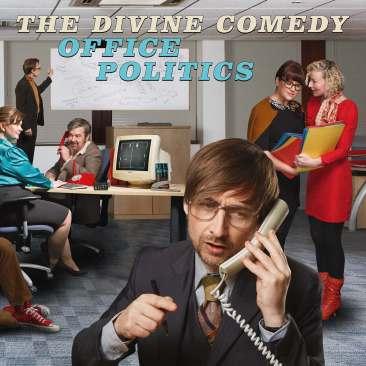
The Divine Comedy’s blend of heartfelt romanticism, magnetic melodies and witty, sometimes very cutting, observations has always been a winner and now after 30 years (!), Neil Hannon is set to release his twelfth album in this guise – ‘Office Politics’. Inspired by the soap opera that is the workplace, the record is 16 songs long and stars a cast of ‘inventive, timeless and irreverent characters’. As well as plenty of piano and orchestral maneuvers, the record finds Neil embracing his love of synths and the New Romantic movement…
The record opens with the jaunty recent single ‘Queuejumper’, a song if taken the wrong way could be seen as a fat cat (or Tory?) anthem. However, Neil’s tongue is firmly in cheek as he takes the mantle of the character who is never shy to tell you that: ‘You’re just jealous of the money I’m making’. We all now someone like that. Following this is the title track, a song with a Kraftwerk-style opening that finds Neil advising you to ‘book your place on the hamster wheels’ and then talking through the people that seemingly exist in every office while the song gets ever more soulful with bluesy backing vocals and elements of jazz thrown into the mix: ‘Always thinks outside the box, always wears hilarious socks’; ‘There was no stopping her taking a ride on the photocopier’; ‘put your hand where it shouldn’t be and you’ll soon be on indefinite leave’.
‘Norman and Norma’ is a more traditional piano-led Divine Comedy song with Neil talking about a couple’s marriage and subsequent trip to Mallorca. He reveals how they always dreamed of rekindling this spark, even after redundancy and general life stuff (’20 years on and the children have gone and they’re both at a loss’). Norman and Norma find a new passion in the most unlikely of places: ‘One day in Clacton, there’s a re-enactment of Normans and Saxons and this gets their juices flowing’. The guitar stabs of ‘Absolutely Obsolete’ help Neil draw parallels between a failing relationship and how the music industry treats acts ‘of a certain age’: ‘You’ll find me in the bargain bin at the Oxfam shop’; I always thought we had a funny relationship. I would do the work that made the money and you’d spend it’. With Chris Difford offering guest vocals, it sounds like Squeeze meeting Duke Special before delving into more psychedelic tones. The industrial-sounding ‘Infernal Machines’ is about a machine-led revolution while ‘You’ll Never Work in This Town Again’ starts like something from The League of Gentlemen before evolving into the kind of sound that fits Disney villains so well. It finds Neil rallying against those who want a ‘life of ease’ with ”everything done by machines’ and how you should be careful what you wish for with ‘crazy algorithms making up your mind’.
‘Psychological Evaluation’ takes the form of an interview between a robotic synth voice and Neil, with questions regarding cleanliness, physical well-being, interests (‘I’m reading Oliver Twist by Charles Dickens in very short nightly doses’), influences (‘The Human League, OMD, Heaven 17. Buggles’), aspirations (‘to take more train journeys and be kinder’), regrets (‘I’ve had a few’ sung, of course) and things that are altogether more intimate (‘brown, firm, if slightly irregular’). Although ‘The Life and Soul of the Party opens in more ambient style with the sound of a crowd gathering, the guitars channel Nile Rodgers as Neil proudly declares: ‘I am the center of attention, bathing in the glow’; ‘I want to make a connection and dribble in your ear’; ‘Although I can hardly stagger, I’m taking to the floor. I’ve got the moves like Jagger after a drink or four’. Things take another surprise turn on the theatrical and piano-infused ‘I’m a Stranger Here’, with Neil pleading for help: ‘I went out for a loaf of bread and now everything I love is dead’.
Neil talks into a dictaphone Dale Cooper style at the beginning of ‘Philip and Steve’s Furniture Removal Company’. His idea? A sitcom ‘based on the early lives of Philip Glass and Steve Reich in New York in the ’60s. Many hilarious gags about the repetitive nature of the work and the phases that Steve’s life goes through’. He then delivers a line from the theme tune and the song evolves into that very song – complete with layered vocals, glockenspiel and handclaps. It then takes inspiration from its subjects as the melodies become more minimal. ‘After the Lord Mayor’s Show’ is a heartbreaking and anthemic ballad with elements of Ben Folds’ quieter moments, while the closing ‘When the Working Day is Done’ captures the feeling of relief ‘when the working day is through and you’re waiting in the rain for another overdue, overcrowded railway train’. As the strings come in, Neil passionately sings how ‘we give and get nothing back’ and how you can try to find solace from the daily grind and keep yourself amused by ‘reading the Financial Times of the fellow next to you’.
Practically a double album, ‘Office Politics’ is a charming listen that captures the characters you’ll come across during your career and showcases Neil Hannon’s excellence at storytelling and ear for instantly hummable melodies. You’ll also find yourself falling for the characters – who wouldn’t want to see a Norman and Norma drama series?
